ADA Violation: Mini of St. Louis Doesn’t Have Required Pedestrian Access They Said They Would
Back in 2011 Mini of St. Louis announced they would relocate from Clayton to a large site adjacent to the Sunnen MetroLink light rail station (blue line). I took the opportunity to remind them they needed to provide an accessible pedestrian route.
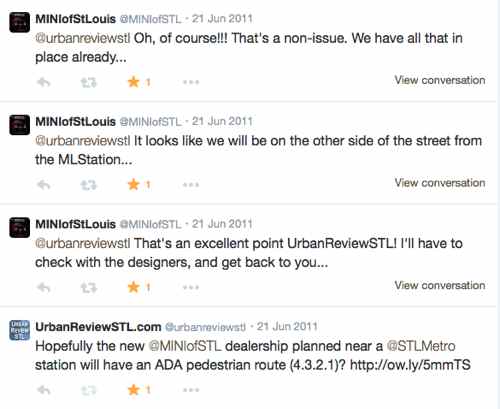
They said ” Oh, of course!!! That’s a non-issue. We have all that in place already…” but I knew the dismal record of their architects on pedestrian accessibility. In October 2012 I blogged about what I was seeing happening at this station, see Transit-Ignored Development (TID) At Sunnen MetroLink Station
Earlier this month I visited again to see if it turned out as I’d predicted. Unfortunately, it did.
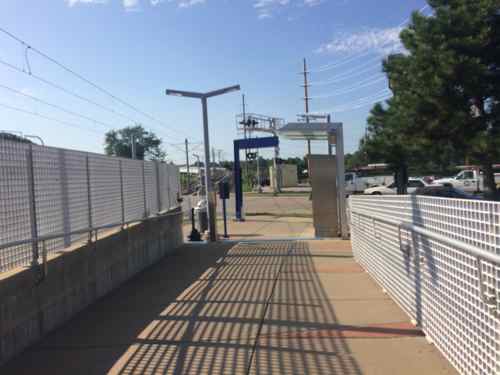
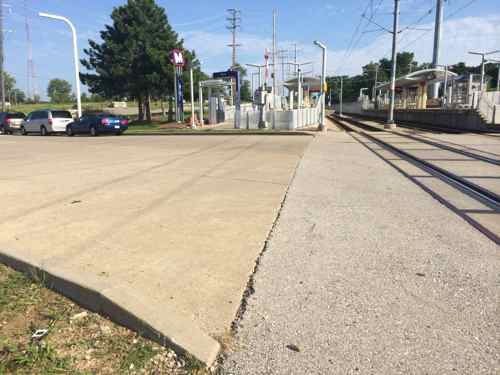
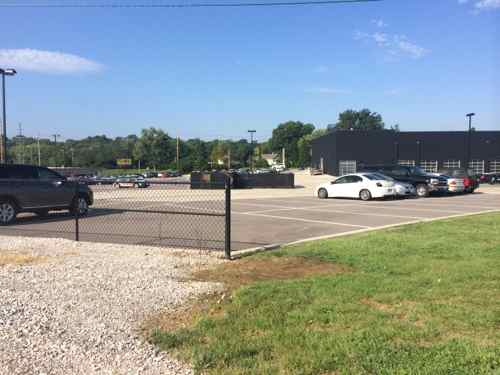
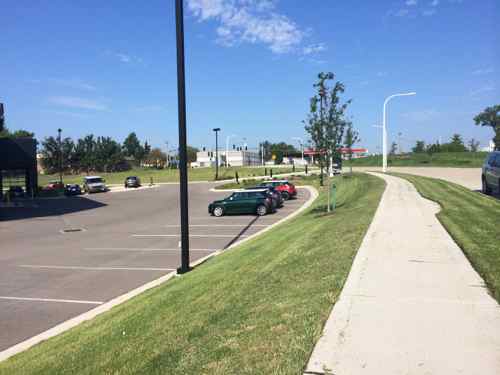
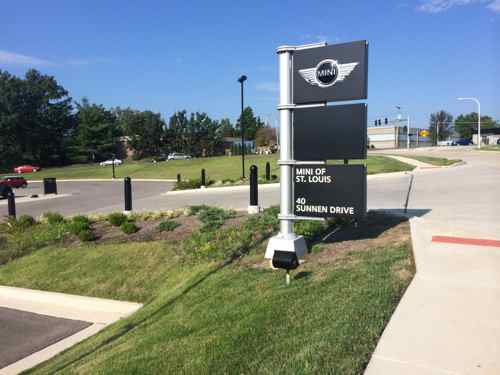
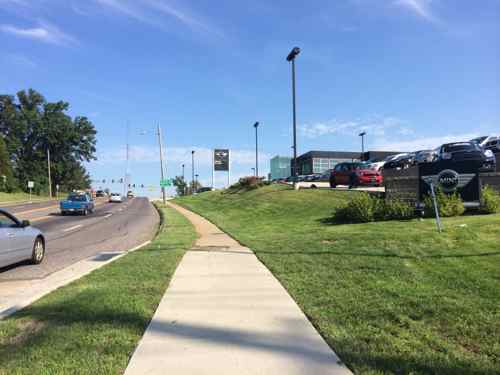
It’s very simple folks, if you’re building on a site that has public sidewalks, transit stops (bus or rail), or another way for a pedestrian to reach the building you need to provide an accessible route. The Dept of Justice, in a 1993 letter, gave an example of when an accessible route isn’t required:
For example, the Standards would not require that a developer provide an accessible route between an accessible entrance to a retail store and a major highway bordering the site, if customers only have access to the store by driving to the parking lot. (US DOJ — recommended reading)
In urbanized areas (non-rural) even sites next to highways can be accessed by pedestrians because of other streets & sidewalks. This type of anti-pedestrian development isn’t tolerable anywhere in the region, especially next to a light rail station that had such potential. Crossing the street at the station can be retrofitted as can an accessible route to Mini of St. Louis.
For once I’d like it if our new construction included planning for pedestrians.
— Steve Patterson
This is located in the city of Maplewood. This looks like who you should be talking to: http://www.cityofmaplewood.com/index.aspx?nid=97
I disagree with your comment/analysis under the first photo. When the Sunnen Station was constructed, the civil engineer did do a good job of responding to the existing conditions: https://www.google.com/maps/place/Maplewood,+MO/@38.6071296,-90.3306421,76m/data=!3m1!1e3!4m2!3m1!1s0x87d8ca89e158dacb:0xc2534f0b136ca5d . . there was no need for pedestrians to follow the tracks across Sunnen, in fact, it should have been (and was) actively discouraged. The “problem” is that there used to be a “good” pedestrian crossing at Laclede Station, but that went away (and was apparently not replaced) when Laclede Station was vacated and removed south of Sunnen. Is that the city’s fault? Mini of St. Louis? Metro? The developer? The civil engineer? All of the above? None of the above?
I do agree that it would be great / make a lot of sense if there were a direct pedestrian connection between the Metrolink station and the dealership, since it would make easy for Mini owners to get to Clayton and other places while their cars are being serviced. And YES, having no connection between Hanley or Sunnen and the front door to the new building IS a direct violation of the ADA. Unfortunately, as both you and I know, the ADA is civil rights legislation. It’s reactive, not proactive. It’s only enforced after someone complains. Yes, it’s good design practice to anticipate and try to avoid violating the ADA. It’s also up to the local jurisdictions to adopt and to ENFORCE the current building codes, which also cover many of these situations. Unfortunately, we’re “too nice” here in the midwest. We tend not to complain, and to do so quietly. I’m used to the Colorado Cross-Disability Coalition (http://ccdconline.org/), who are not afraid to go public, file suits, publicly demonstrate over situations like this. Tweeting is one thing, having a dozen people with disabilities showing up and blocking their entrance would be a whole ‘nuther thing, and probably way more effective in both raising public awareness and getting the problem fixed!
This whole project is a disgrace. Minis are pretty cool, but I’m never buying anything from this place or the AutoHaus across the street. What a waste of a great transit-adjacent site. Plus their lots spew out bright light pollution like nobody’s business.
This area was a total PIT area with crime and run down homes and
apartments. The addition of MINI of ST Louis was greatly appreciated
and makes the area look GREAT.
New doesn’t mean better. Functionally the area is worse than before.
Agree – is it better to have affordable housing or an auto dealership next to a light rail station?
Interesting that someone posting from a NY NY IP address is familiar with the area. Again, older doesn’t mean “run down.”
You really need to get a life. This area was a total PIT area with crime and run down homes and apartments. The addition of MINI of ST Louis was greatly appreciated and makes the area look GREAT. You have too much time nitpicking crap like this. Get a girlfriend or something or spend time complaining about something that makes sense.
As someone without any disabilities, I still whole heartedly agree with Stephen’s assessment. Perhaps JZ71 is correct. I have no idea. But the the fact is that the lack of good pedestrian access is a big problem for many people and should be fixed by someone. I can jump across train tracks fine, and cut across lawns no problem. But when my son was younger and I was pushing his baby carriage around, it stops being simple, and certainly I need a *safe* way of walking. Not all of us have cars–for me it wasn’t a choice, I couldn’t afford a car. But I still needed to get around. Maybe the problem is that you who don’t have a stake in this issue should stop being a jerk to someone who has real issues traveling and get a boyfriend or something and spend time complaining about something that makes sense.
I have a wonderful life, my husband and I returned from our honeymoon yesterday: a week in Colorado & Wyoming!
Nonsense. The area looks like a giant parking lot, not “great.” I would rather have 10 of the affordable apartment complexes than this giant, over-lit, over-paved behemoth.
You need an organization with the funding to sue places which violate the ADA like this. It could theoretically be self-sustaining; each time you win, you get enough damages to pay for the legal expenses, so you’d keep replenishing your starting capital.
Nice idea, but that’s not how the ADA works. The resolution to violations isn’t a big monetary settlement, it’s correction of the problem.
I’d turn to our strongest organization, Paraquad, but their facility lacks the required route as well. They fight for disabled parking. A true St. Louis organization.